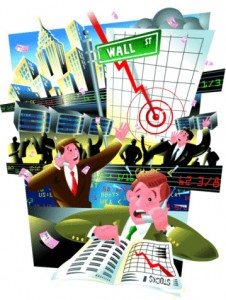 FSB stands for “Financial Stability Board.” It represents the world’s main regulators and central banks.
FSB stands for “Financial Stability Board.” It represents the world’s main regulators and central banks.
Let’s listen in to “Financial Stability Board Warns on Exchange Traded Funds:”
Exchange traded funds pose a serious risk of causing a new financial crisis and should be put under the spotlight so that the signs of a market crash are spotted early, according to the Financial Stability Board.
…
In particular, the FSB said it was worried that ETFs could exacerbate the impact of a future crisis as many funds are not fully-backed by the asset they are invested in.
“The expectation of on-demand liquidity may create the conditions for acute redemptions pressures on certain types of ETFs in situations of market stress, which could in turn affect the liquidity of the large asset managers and banks active in this market,” said the FSB.
Lord Turner, chairman of the Financial Services Authority, is among the senior regulators to have warned of the risks presented to the financial system by ETFs, in particular those that offer leverage.
ETFs have become popular among retail investors in recent years as they offer a cheaper way for the public to get exposure to assets they would normally find it difficult to invest in such as physical commodities such as gold and oil.
Jonathan Compton, founder of Bedlam Asset Management, has warned repeatedly of the dangers of ETFs and said a crisis in the market was a question of “when not if”.
“Retail investors will get crushed in any crash, but large pension funds also have huge holdings in ETFs too,” said Mr Compton.
The ETF market is currently reckoned to be worth more than $1.2 trillion (£733bn), having more than doubled in size over the last five years.
While early ETFs were backed entirely by whatever asset they were invested in, newer funds have been created which use derivatives to mirror the performance of the actual asset.
Developments such as these are at the heart of concerns about what would happen in the event there was ever a run on the market.
“There is a risk that investors massively demand redemption,” said the FSB.
For some ETF providers, more of their income now comes from lending out the securities they hold on behalf of their investors to third-parties than they make in management fees.
Many suspect that ETFs are at least partially responsible for many of the asset bubbles that have sprung up around the world, pumping up the price of commodities ranging from coffee to lean hog meat.
Gold ETFs are one of the largest fund types, with the largest holding reserves worth more than $30bn.
[Emphasis added]No one can be sure how this is going to play out during a severe market pull back or worse, a move into bear market territory.
How can you avoid getting caught with questionable ETF positions during a period of massive redemption demands?
First, avoid those ETFs that are obviously tied to derivatives. They are the leveraged ones that attempt to mirror a 200% or 300% performance of the underlying asset on the long and on the short side.
Second, from my trend tracking experience over the past 25 years, I have found that markets don’t crash overnight. That is by no means a guarantee it won’t happen in the future but, generally speaking, a period of asset deterioration usually precedes any crash, such as we’ve seen in 2008.
If you follow the trends in the market place, and implement my recommended sell stop discipline, you will have put the odds in your favor that you’ll be on the sidelines long before disaster strikes. Actually, our sell stop discipline will have you out of the market even before our TTIs (Trend Tracking Indexes) signal a directional shift into bear market territory.
Looking in the rear view mirror, that is what happened in 2008 when our domestic TTI signaled a sell effective 6/23/08, but the real market crash did not materialize until August 2008.
I believe that following major trends in the market place is the most important component in dealing with today’s global uncertainty. Those investors, who remain stuck in the buy-and-hold mode of operation, will again be left holding the bag—and a much emptier bag it will be.
Contact Ulli
Comments 1
Reader Srini had problems with the comment section for some reason. It seems to be working fine.
Here’s what he had to say:
“Again, the facility for leaving comments is not working. Can you please open it up? Otherwise we loose the interactivity to learn from you.
You had indicated that it is better to avoid double and triple ETFs as they may not hold the actual equities.
1. Will owning ETFs like VWO or VTI also have similar problems?
2. Will short ETFs like SH or SDS have the problem you had indicated”
No one knows at this point. Most certainly, the leveraged ETFs like SDS may have an issue. That’s why you want to be out of the market before the exit doors get crowded.
Ulli…